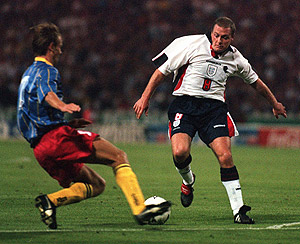Multi-club ownership model: The good, the bad and the ugly behind football's newest structural trend
The real concern comes down to football's growing trend of big corporations taking up slices of the world game at the expense of smaller teams.

England's Paul Gascoigne, right, in action against Moldova during the World Cup qualifing match at Wembley Stadium in London Wednesday, Sept. 10, 1997. England defeated Moldova 4-0. England now only need one point in the qualifying climas in Rome on Oct. 11 to win the ghroup and condemn Italy to the second-placed lottery. AP Photo/Dave Thomson
As the teary eyed middle-aged Englishmen finished speaking, you could see the sadness in his eyes, a familiar look we’ve seen many times before: on the pitch of the Stadio delle Alpi in 1990, in tabloid snaps, and now as he bid farewell to one of the few managers who’d brought out the best in him, Sir Bobby Robson.
As the shadowy image of Paul Gascoigne is replaced by a photo of ‘Sir Bobby’ putting a hand on his shoulder in the moments following England’s infamous 1990 World Cup Semi-Final loss to West Germany, the voiceover recalls how Robson was “a father figure to England’s wayward star.”
And that’s exactly what ‘Gazza’ was and still is.
The former England international embodies both the best and worst of football: that remarkable ability to inspire millions by creating a goal out of nothing but also the dark controlling demons which are all too often paired with such talent.
It’s something Gascoigne has wrestled with his entire life.
He’s not alone though. Countless other players face similar challenges and do so alone.
There is no support, either.
For all the money in football, its global influence and Sepp Blatter’s goal to change the world “one football at a time,” players are essentially alone when faced with life’s challenges (often magnified by the celebrity of being a footballer).
The AFL Players Association is certainly heading in the right direction with its player support system. The assistance offered to Nathan Thompson during his regrettably publicised battle with depression is an example of what should be implemented as standard across FIFA’s 208 national associations.
For their part, the Australian Professional Footballers’ Association, which is the trade union for all players of the round ball game, have their My Football Career program.
Having looked at the program, and through my discussions with APFA Chief Executive Brendan Schwab in the past, I feel there is still more that can be done.
Still, it’s an amicable step forward.
Globally there is no universal equivalent, and here in England, former Arsenal defender Tony Adam’s Sporting Chance Clinic is the closest thing.
Now, this doesn’t excuse the behaviour of current and former players like Gasocigne when they cross the line from laughable larrikin to offensive perpetrator. But we should be supporting them before they reach this point.
Prevention not treatment.
It’s too easy to only see the fast cars and giant pay checks footballers receive and forget there’s a person caught in the middle.
Supporting football’s protagonists off and away from the football pitch is one of the two most important aspects of football and an area in which we are all failing.
That other aspect is spectator safety, an area which won a big victory last week, albeit twenty years too late.
On Wednesday, British Home Secretary Alan Johnson agreed to release previously unseen documents relating to the 1989 Hillsborough disaster. A fair and reasonable process for how this will happen has also been agreed.
There’s still a way to go, but it looks like the families of the 96 victims will finally get what they’ve spent twenty years fighting for: the truth.